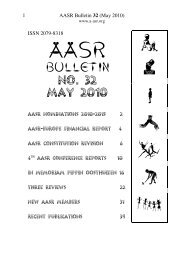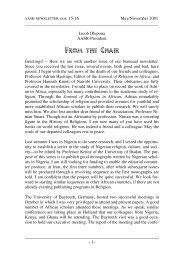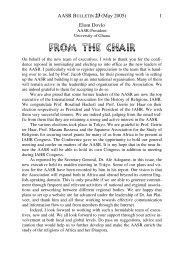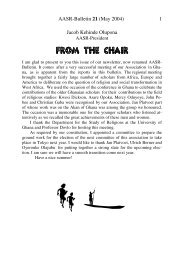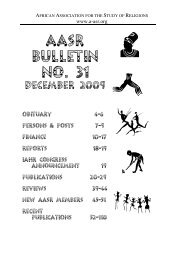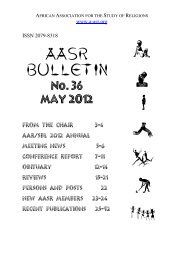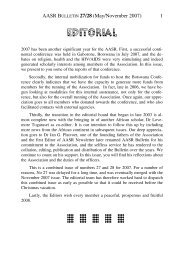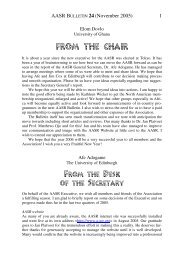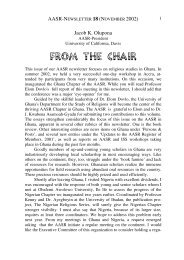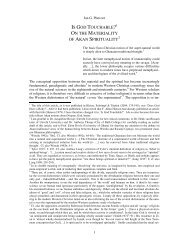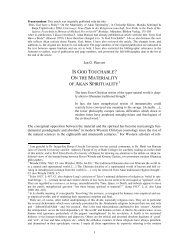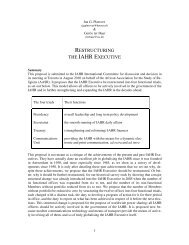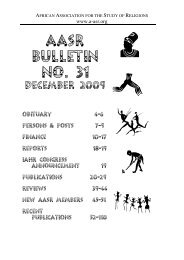AASR Bulletin 35 - The African Association for the Study of Religions
AASR Bulletin 35 - The African Association for the Study of Religions
AASR Bulletin 35 - The African Association for the Study of Religions
Create successful ePaper yourself
Turn your PDF publications into a flip-book with our unique Google optimized e-Paper software.
<strong>AASR</strong> BULLETIN <strong>35</strong> (NOVEMBER 2011)<br />
www.a-asr.org<br />
61<br />
through <strong>the</strong> use <strong>of</strong> two sets <strong>of</strong> ideological constructs, namely, mono-faith and multi-faith RE<br />
and confessional and non-confessional RE. <strong>The</strong>se constructs also <strong>for</strong>ms <strong>the</strong> <strong>the</strong>oretical framework<br />
<strong>of</strong> this article. Insights gained through <strong>the</strong> use <strong>of</strong> a phenomenological methodology engaged<br />
a multi-category elite sample <strong>of</strong> Ministry <strong>of</strong> Education <strong>of</strong>ficials, secondary school head<br />
teachers (principals), and leaders <strong>of</strong> nationally organised faith-communities. <strong>The</strong> findings suggest<br />
that conflicting ideologies create contradictions <strong>for</strong> <strong>the</strong> introduction <strong>of</strong> new curriculum<br />
policy.]<br />
Strijdom, Johannes, 2009, ‘Nationalizing Religion: <strong>The</strong> Violent Path <strong>of</strong> Religious Nationalism’, in<br />
Alternation: Interdisciplinary Journal <strong>for</strong> <strong>the</strong> <strong>Study</strong> <strong>of</strong> <strong>the</strong> Arts and Humanities in Sou<strong>the</strong>rn<br />
Africa 16, 3: 254-269; full text at:<br />
http://alternation.ukzn.ac.za/docs/Alternation%20Spec%20Ed%203%20Pdfs/13%20Strijdom<br />
%20FIN%5B1%5D.pdf<br />
[<strong>The</strong> article not only accepts <strong>the</strong> distinction between indigeneity and hybridity as two extreme<br />
positions in postcolonial studies, but argues that <strong>the</strong> <strong>for</strong>mer paradigm’s rigid and essentialist<br />
definition <strong>of</strong> identity may contribute to intolerance and violence. Examples <strong>of</strong> religious nationalism<br />
within Buddhist, Hindu and Christian traditions are juxtaposed to illustrate <strong>the</strong> point,<br />
and <strong>the</strong>ir relevance <strong>for</strong> a critique <strong>of</strong> monolithic Afrocentric views is postulated. In conclusion,<br />
<strong>the</strong> struggle to defend constitutional promises that respect cultural diversity and <strong>the</strong> promotion<br />
<strong>of</strong> a cosmopolitan education are presented as necessary antidotes to <strong>the</strong> problem <strong>of</strong> homogenizing<br />
tendencies.]<br />
Tayob, Abdulkader, 2010, ‘Muslim Shrines in Cape Town: Religion and Post-Apar<strong>the</strong>id Public<br />
Spheres’, in Bompani & Frahm-Arp 2010: 56-73<br />
Tayob, Abdulkader, 2011, ‘Muslim Marriages: From Constitution to Legislation’, in Tayob<br />
2011a: 1-5<br />
Tayob, Abdulkader, 2011, ‘Report on <strong>the</strong> Meeting’, in Tayob 2011a: 52-54<br />
Tayob, Abdulkader, (ed.) 2011a, Muslim Marriages in South Africa: From Constitution to Legislation:<br />
Papers Presented At Muslim Marriages Workshop, Saturday 22 May 2010, Capetonian<br />
Hotel. Cape Town: Centre <strong>for</strong> Contemporary Islam, UCT; full text at:<br />
http://www.cci.uct.ac.za/usr/cci/news/big/Muslim_Marriages_Papers.pdf<br />
[<strong>The</strong> Centre <strong>for</strong> Contemporary Islam at UCT organized this workshop to discuss <strong>the</strong> deadlock<br />
on <strong>the</strong> proposed Bill to recognize Muslim marriage conducted only according to Muslim<br />
rites.]<br />
Tayob, Abdulkader, Inga Niehaus & Wolfram Weisse (eds.) 2011b, Muslim Schools and Education<br />
in South Africa and Europe. Münster: Waxmann, 198 pp., ISBN 978-3-8309-2554-5<br />
(pbk), Euro 24.90 (= Religionen im Dialog, 5)<br />
[This edited collection presents Islamic education in South Africa and a number <strong>of</strong> countries<br />
in Europe. It brings toge<strong>the</strong>r general concerns <strong>of</strong> education among Muslims, toge<strong>the</strong>r with current<br />
and unique developments in each country. Given <strong>the</strong> place <strong>of</strong> Islamic education in public<br />
debate, <strong>the</strong> collection includes a variety <strong>of</strong> contributions that respond to <strong>the</strong> goals and future <strong>of</strong><br />
Islamic education, <strong>the</strong> context <strong>of</strong> terrorism and counter-terrorism, <strong>the</strong> place <strong>of</strong> religious education<br />
in <strong>the</strong> context <strong>of</strong> secular education and <strong>the</strong> role religious education plays in promoting or<br />
hindering social cohesion. It includes reflections on where Muslims should be directing education<br />
in <strong>the</strong> next few years to make it socially relevant and contribute to <strong>the</strong> democratization <strong>of</strong><br />
society, as well as some comments on <strong>the</strong> un<strong>for</strong>tunate but real crosscurrents in educational<br />
policy and counter-terrorist initiatives. In between, it contains some reflective essays on <strong>the</strong><br />
uniqueness and commonalities <strong>of</strong> Islamic education in various countries, on unexpected and<br />
unknown outcomes, and on new philosophies <strong>of</strong> education. In fact, <strong>the</strong> essays may be seen as<br />
critical contributions on a number <strong>of</strong> <strong>the</strong>mes that are debated in <strong>the</strong> public sphere and within<br />
<strong>the</strong>se schools.]<br />
Ugba, Abel, 2011, ‘<strong>African</strong>-led Pentecostalism in 21st Century Ireland: A Historical and Substantive<br />
Analysis’, in Ludwig & Asamoah-Gyadu 2011: 273-288



